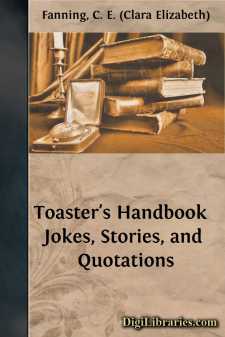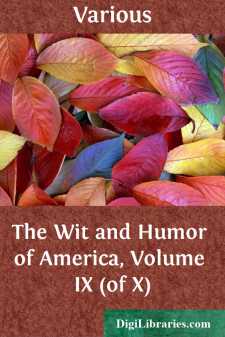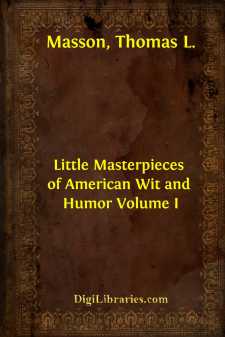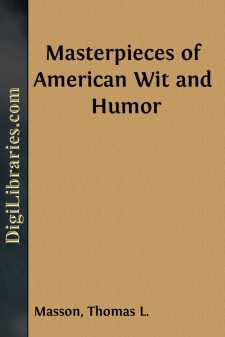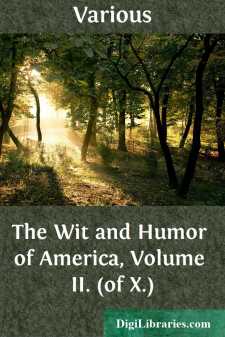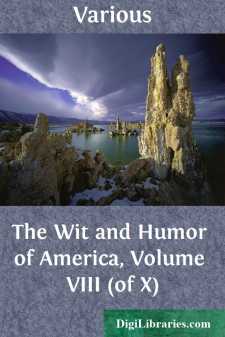Categories
- Antiques & Collectibles 13
- Architecture 36
- Art 48
- Bibles 22
- Biography & Autobiography 813
- Body, Mind & Spirit 142
- Business & Economics 28
- Children's Books 17
- Children's Fiction 14
- Computers 4
- Cooking 94
- Crafts & Hobbies 4
- Drama 346
- Education 46
- Family & Relationships 57
- Fiction 11829
- Games 19
- Gardening 17
- Health & Fitness 34
- History 1377
- House & Home 1
- Humor 147
- Juvenile Fiction 1873
- Juvenile Nonfiction 202
- Language Arts & Disciplines 88
- Law 16
- Literary Collections 686
- Literary Criticism 179
- Mathematics 13
- Medical 41
- Music 40
- Nature 179
- Non-Classifiable 1768
- Performing Arts 7
- Periodicals 1453
- Philosophy 64
- Photography 2
- Poetry 896
- Political Science 203
- Psychology 42
- Reference 154
- Religion 513
- Science 126
- Self-Help 84
- Social Science 81
- Sports & Recreation 34
- Study Aids 3
- Technology & Engineering 59
- Transportation 23
- Travel 463
- True Crime 29
Toaster's Handbook Jokes, Stories, and Quotations
Description:
Excerpt
ON THE POSSESSION OF A SENSE OF HUMOR
"Man," says Hazlitt, "is the only animal that laughs and weeps, for he is the only animal that is struck with the difference between what things are and what they ought to be." The sources, then, of laughter and tears come very close together. At the difference between things as they are and as they ought to be we laugh, or we weep; it would depend, it seems, on the point of view, or the temperament. And if, as Horace Walpole once said, "Life is a comedy to those who think, a tragedy to those who feel," it is the thinking half of humanity that, at the sight of life's incongruities, is moved to laughter, the feeling half to tears. A sense of humor, then, is the possession of the thinking half, and the humorists must be classified at once with the thinkers.
If one were asked to go further than this and to give offhand a definition of humor, or of that elusive quality, a sense of humor, he might find himself confronted with a difficulty. Yet certain things about it would be patent at the outset: Women haven't it; Englishmen haven't it; it is the chiefest of the virtues, for tho a man speak with the tongues of men and of angels, if he have not humor we will have none of him. Women may continue to laugh over those innocent and innocuous incidents which they find amusing; may continue to write the most delightful of stories and essays—consider Jane Austen and our own Miss Repplier—over which appreciative readers may continue to chuckle; Englishmen may continue, as in the past to produce the most exquisite of the world's humorous literature—think of Charles Lamb—yet the fundamental faith of mankind will remain unshaken: women have no sense of humor, and an Englishman cannot see a joke! And the ability to "see a joke" is the infallible American test of the sense of humor.
But taking the matter seriously, how would one define humor? When in doubt, consult the dictionary, is, as always, an excellent motto, and, following it, we find that our trustworthy friend, Noah Webster, does not fail us. Here is his definition of humor, ready to hand: humor is "the mental faculty of discovering, expressing, or appreciating ludicrous or absurdly incongruous elements in ideas, situations, happenings, or acts," with the added information that it is distinguished from wit as "less purely intellectual and having more kindly sympathy with human nature, and as often blended with pathos." A friendly rival in lexicography defines the same prized human attribute more lightly as "a facetious turn of thought," or more specifically in literature, as "a sportive exercise of the imagination that is apparent in the choice and treatment of an idea or theme." Isn't there something about that word "sportive," on the lips of so learned an authority, that tickles the fancy—appeals to the sense of humor?
Yet if we peruse the dictionary further, especially if we approach that monument to English scholarship, the great Murray, we shall find that the problem of defining humor is not so simple as it might seem; for the word that we use so glibly, with so sure a confidence in its stability, has had a long and varied history and has answered to many aliases....


